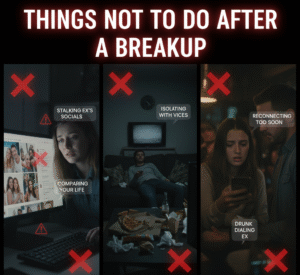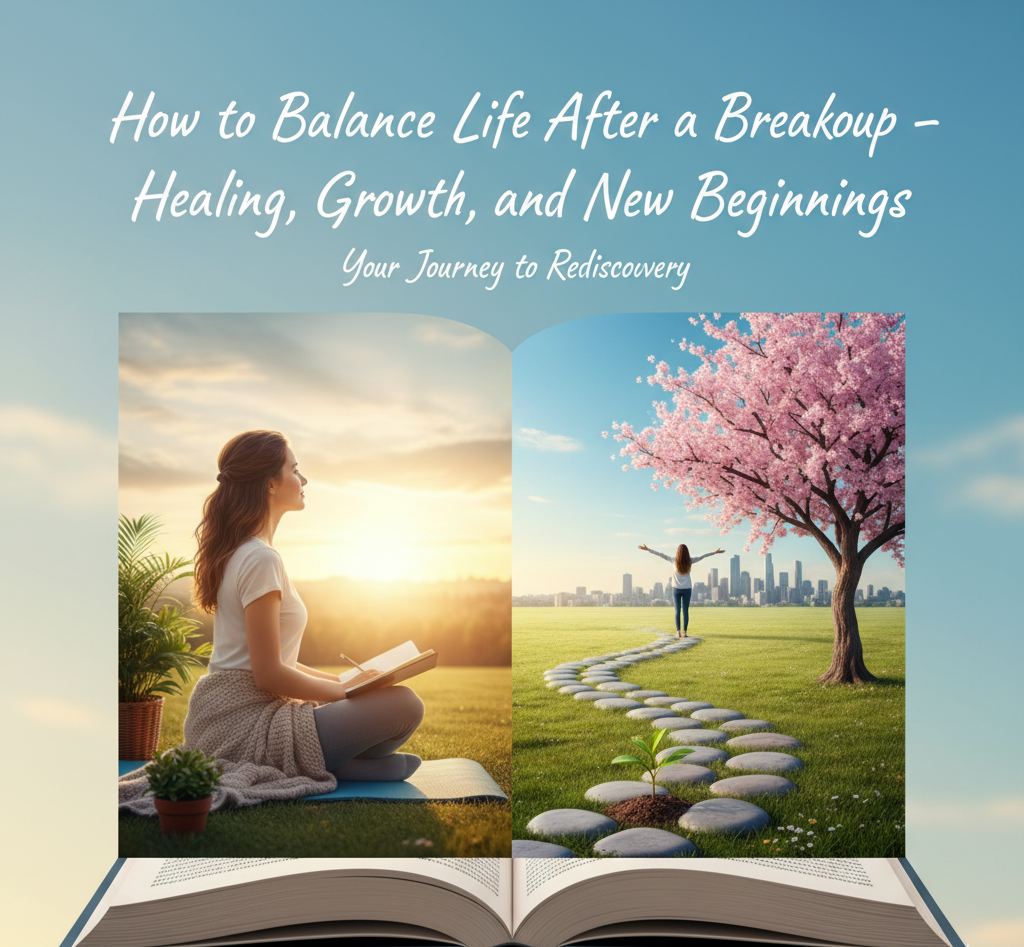How to Balance Life After a Breakup
Sometimes endings are disguised as new beginnings.
A breakup can feel like the ground beneath your feet has collapsed. Whether it’s the end of a short relationship or a long-term commitment, the pain leaves you questioning yourself and your future. Nights may feel longer, routines may seem meaningless, and silence may feel heavy. But just as seasons change, so does life. Healing is not about forgetting someone; it’s about finding yourself again.
This article explores how to balance life after a breakup through self-care, psychology-backed insights, and practical steps.
1. Accept the End, Don’t Resist It

In Japanese philosophy, acceptance is often described as “Shikata ga nai”—what cannot be helped must be endured. Similarly, the first step after a breakup is acceptance.
-
Stop fighting reality. The relationship has ended; replaying “what ifs” only delays healing.
-
Allow grief. Cry if you must. Journal your feelings. Speak to a close friend. Acknowledging pain is healthier than suppressing it.
-
Let go of blame. Both partners contribute to dynamics—avoid burdening yourself with guilt or resentment.
Hack: Write a closure letter you never send. It helps your mind release unresolved emotions.
2. Rebuild Daily Routine

After a breakup, life often feels scattered. Having structure brings back a sense of control.
-
Wake up and sleep at regular times.
-
Exercise daily—even a 20-minute walk helps release endorphins.
-
Eat balanced meals instead of skipping or overindulging.
-
Replace late-night overthinking with reading, meditation, or calming music.
Psychologists say routine creates emotional stability, especially when everything else feels uncertain.
3. The Power of Silence After Breakup

One of the hardest yet most powerful tools is silence. Silence doesn’t mean weakness; it’s a conscious choice for growth.
-
No-contact rule: Stop calling, texting, or stalking their social media. This creates emotional distance.
-
Self-focus: Silence gives you the space to reflect on who you are outside the relationship.
-
Respect: Silence avoids unnecessary arguments or repeated pain.
Hack: Treat silence as an act of self-love, not punishment. It creates room for healing.
4. Rediscover Your Identity

In long-term relationships, people often lose touch with their individuality. Post-breakup is a chance to reclaim it.
-
Pursue hobbies you abandoned—painting, writing, cooking, or traveling.
-
Learn something new—online courses, fitness routines, or skills.
-
Reconnect with old friends and social circles.
Think of it as reintroducing yourself to yourself.
5. Understand the Psychology of Breakups

Breakups trigger emotions similar to withdrawal symptoms because love activates dopamine pathways in the brain. This is why cravings and obsessions feel so intense.
Psychologists suggest:
-
Acknowledge that your brain is going through chemical imbalance—it’s temporary.
-
Practice mindfulness and meditation to calm overactive thoughts.
-
Therapy or counseling can help you understand attachment styles and patterns.
Hack: Whenever obsessive thoughts rise, redirect focus to a physical activity (yoga, running, or even cleaning your room).
6. What to Do After a Breakup for Guys

Men often struggle silently because society expects them to “be strong.” Suppressed emotions, however, can lead to anger or depression.
-
Talk to a trusted friend—don’t bottle it up.
-
Avoid rebound relationships just to fill the void.
-
Channel emotions into productive outlets like fitness, work, or creative projects.
-
Practice self-care—grooming, healthy diet, and quality sleep.
Remember, vulnerability is not weakness—it’s part of healing.
7. How to Deal with a Breakup When You Still Love Them

Perhaps the hardest stage is moving forward while still being in love.
-
Understand love and compatibility are different—sometimes love exists, but the relationship is unhealthy.
-
Create distance, even if you still care; closeness will only prolong the pain.
-
Accept that letting go is an act of respect for yourself and for them.
Hack: Write down reasons why the relationship ended. Revisit it whenever your heart tries to convince you to go back.
8. Things Not to Do After a Breakup

Healing doesn’t just depend on what you do—it also depends on what you avoid.
-
Don’t beg or chase. It lowers your self-worth and rarely changes outcomes.
-
Don’t isolate completely. Alone time is fine, but shutting everyone out delays recovery.
-
Don’t rush into rebound. It may mask pain temporarily but adds new complications.
-
Don’t keep re-reading old messages or photos. It reopens wounds.
Hack: If deleting memories feels too hard, store them in a digital folder or box, then keep it out of sight.
9. Transform Pain Into Growth

History and philosophy remind us that pain often becomes the seed of transformation. Breakups can teach:
-
Emotional resilience.
-
Clearer understanding of what you want in future relationships.
-
Stronger independence and self-love.
Hack: Keep a “growth journal” where you write one positive learning every week post-breakup.
FAQs – How to Balance Life After a Breakup
1. Power of silence after breakup
Silence allows healing, creates emotional distance, and prevents unnecessary conflicts. The no-contact rule is powerful in breaking emotional dependency.
2. What to do after a breakup of a long-term relationship?
Rebuild your routine, reconnect with yourself, avoid unhealthy coping, and give yourself permission to grieve. Long-term relationships need longer healing time.
3. How to balance life after a breakup psychology?
Understand that your brain reacts like it’s in withdrawal. Manage emotions with mindfulness, therapy, exercise, and structured routines for stability.
4. What to do after a breakup for guys?
Express emotions instead of suppressing them, avoid rebound relationships, focus on fitness and personal goals, and seek support from friends or mentors.
5. How to deal with a breakup when you still love them?
Accept that love doesn’t always mean compatibility. Create distance, remind yourself of the reasons for separation, and redirect energy towards self-growth.
6. Things not to do after a breakup
Don’t chase your ex, don’t isolate completely, avoid rebounds, and don’t revisit old texts/photos. These actions delay emotional recovery.
Conclusion
Balancing life after a breakup is not about forgetting someone—it’s about rediscovering yourself. The silence, the pain, the lonely nights—they all become stepping stones to a stronger, wiser version of you.
Healing doesn’t come overnight. But if you allow acceptance, self-care, and reflection to guide you, you’ll realize that a breakup isn’t the end of your story—it’s simply the start of a new chapter.
Remember: A relationship may end, but your life continues. And in that life, new beginnings always wait beyond endings.
Also Read – 5 Travel Hacks for Budget Trips in India – Save More, Travel More




Pingback: Natural Ways to Reduce Exam Stress for Students